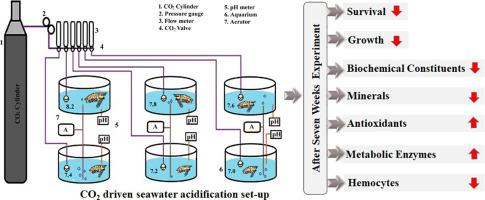Comparative Biochemistry and Physiology C: Toxicology & Pharmacology ( IF 3.9 ) Pub Date : 2020-08-08 , DOI: 10.1016/j.cbpc.2020.108843 T Muralisankar 1 , P Kalaivani 1 , S H Thangal 1 , P Santhanam 2

|
Acidification in the marine environment has become a global issue that creates serious threats to marine organisms. In the present study, we evaluated the effect of CO2 driven acidification on the shrimp Litopenaeus vannamei post-larvae (PL). L. vannamei PL were exposed to six different CO2 driven acidified seawater, such as 8.2 for uniformity (control), pH 7.8 (IPCC-predicted ocean pH by 2100), 7.6, 7.4, 7.2 and 7.0 with corresponding pCO2 level of 380.66, 557.53, 878.55, 1355.48, 2129.46, and 3312.12 μatm for seven weeks. At the end of the acidification experiment, results revealed that the survival, growth, feed index, biochemical constituents, chitin, minerals (Na, K, and Ca), and hemocyte populations of shrimps were found to be significantly decreased in CO2 driven acidified seawater which indicates the negative impacts of acidified seawater on these parameters in L. vannamei. Further, the level of antioxidants, lipid peroxidation, and metabolic enzymes were significantly higher in the muscle of shrimps exposed to acidified seawater suggests that the L. vannamei under oxidative stress and metabolic stress. Among the various acidified seawater tested, pH 7.6 to 7.0 produced a significantly adverse effect on shrimps. Hence, the present study concluded that the elevated level of seawater acidification can produce harmful effects on the biology and physiology of the commercially important shrimp L. vannamei PL.
中文翻译:

暴露于酸化海水的凡纳滨对虾对虾的生长,生化,抗氧化剂,代谢酶和血细胞数量。
海洋环境中的酸化已成为全球性问题,对海洋生物构成了严重威胁。在本研究中,我们评估了CO 2驱动酸化对虾南美白对虾幼虫(PL)的影响。南美白对虾暴露于六种不同的CO 2驱动的酸化海水中,例如8.2(均匀度)(对照),pH 7.8(IPCC预测2100年的海洋pH),7.6、7.4、7.2和7.0,相应的p CO 2七个星期的380.66、557.53、878.55、1355.48、2129.46和3312.12μatm水平。在酸化实验结束时,结果表明,在CO 2驱动的酸化中,虾的存活,生长,饲料指数,生化成分,几丁质,矿物质(Na,K和Ca)和血细胞数量显着减少。表明酸化的海水对南美乳杆菌这些参数的负面影响。此外,暴露于酸化海水的虾的肌肉中抗氧化剂,脂质过氧化和代谢酶的水平明显更高,这表明南美白对虾在氧化应激和代谢应激下。在测试的各种酸化海水中,pH 7.6至7.0对虾产生了明显的不利影响。因此,本研究得出结论,升高的海水酸化水平可能对商业上重要的虾南美白对虾的生物学和生理产生有害影响 。











































 京公网安备 11010802027423号
京公网安备 11010802027423号